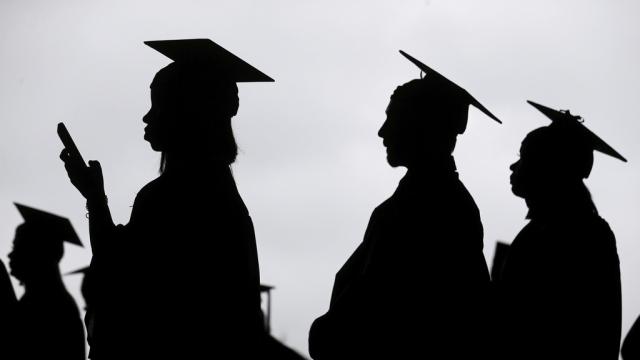For more than three years, the Department of Education hasn't been charging interest or requiring monthly payments from Americans with student debt. On Sept. 1, the student loan interest waiver ends, and first payments will be due Oct. 1.
For some borrowers, the end of these pandemic pauses means trying to squeeze another monthly payment out of an already tight budget.
"I lose sleep over it," said James Wright, a graduate of the University of Wisconsin–Milwaukee. "I'm incredibly stressed about this new payment."
Wright spent 11 years in college, earning a bachelor's degree and then a master's in architecture.
He's been paying down his private student loans all throughout the pandemic. But now, with the federal payments due soon, he's not sure how he and wife Kaitlyn are going to afford it.
"Struggling to figure out how we're going to be able to come up with another $300 or at least $350 a month, potentially more," said Wright.
SEE MORE: Is there another route to student loan forgiveness?
For borrowers like Wright, financial experts say the first thing you should do is log into your account, check your repayment program, and make sure your information is up to date.
"That monthly payment might not accurately reflect what you're actually making today. And so between changing to an income-driven repayment plan and making sure that your income is certified and up to date, those two things should lower your payments to make them more affordable," explained Robert Farrington, a student debt expert and the founder of The College Investor.
Farrington says Americans shouldn't ignore their student debt because not making their monthly payments means their account can go into delinquency or default.
The Biden administration is trying to give Americans more options. The new SAVE repayment plan is designed to help lower monthly payments and minimize the impact of interest for borrowers who qualify. And the White House is offering a grace period for Americans who just can't afford to start making payments.
SEE MORE: Here's who qualifies for Biden's student loan forgiveness programs
"If you're looking at this first payment and you're like, 'Oh, I don't know what to do,' you do have 12 months before they will report you to the credit bureaus and try to come after your wages and take your tax refund," said Farrington.
Wright says he doesn't qualify for the SAVE plan, but he may take advantage of the option to delay making payments. But even with the stress his student loans are now causing, Wright says his degree was worth it.
"I love what I do. I love my job. I am having an impact on my community. My specialty is in K-12 education, so I literally work on designing schools for kids," said Wright.
Trending stories at Scrippsnews.com



